Watch for Updates
Originally Posted June 17, 2016
By Robert Baty

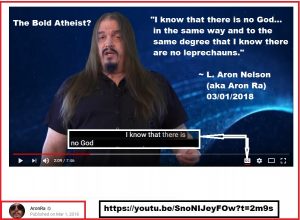
.
Like my Creationism 101 Critical Thinking Exercise, my Atheism 101 Critical Thinking Exercise has quite a long and storied history. It is based on the historical debate between Alexander Campbell and Robert Owen in 1829.
The Exercise as presently formulated, is derived from my own historical debate with Dr. Dziubla on James Randi’s Educational Foundation Forum. That debate is archived at:
http://kehvrlb.com/dziubla-v-baty-atheism-imagination
My FaceBook page dedicated to the Exercise is at:
https://www.facebook.com/Atheism101CTE/
Related FaceBook pages:
https://www.facebook.com/Peter-Boghossian-An-Atheist-Intervention-215602808613449/
https://www.facebook.com/Dan-Linford-v-Robert-Baty-Critical-Thinking-Atheism-557172707709946/
Bernie Dehler, atheist, has invited me to appear on his show next month (July 2016) to discuss both Kent Hovind’s legal problems and the Atheism 101 Critical Thinking Exercise. We’ll see how that goes and may be able to post a link to a YouTube broadcast if the show is produced.
UPDATE: Link to my appearance on YouTube with Bernie Dehler:
https://www.youtube.com/watch?v=gkxNW74wHok&t=1445s
.
.
ATHEISM 101 CRITICAL THINKING EXERCISE ARGUMENT
.
MAJOR PREMISE:
.
– IF (A) man was able to originate
– the idea/concept of God through
– the power of imagination,
–
– THEN (B) man did originate the
– idea/concept of God through the
– power of imagination.
.
MINOR PREMISE:
.
– (A) Man was able to originate the
– idea/concept of God through the
– power of imagination.
.
CONCLUSION:
.
– (B) Man did originate the idea/concept
– of God through the power of imagination.
.
.
ATHEISM 101 CRITICAL THINKING EXERCISE QUESTIONS
(Discussion to Follow)
.
Question #1:
.
Do you think the Atheism 101 Critical Thinking Exercise Argument is so constructed that;
if its premises are true,
then its conclusion will follow as true therefrom
(i.e., that it is logically valid)?
.
– Robert Baty: Yes
– Exercise Participant: (Yes or No)
.
Question #2
.
Do you think that you can take the minor premise and conclusion of a logically valid “modus ponens” form argument and construct the major premise therefrom?
.
– Robert Baty: Yes
– Exercise Participant: (Yes or No)
.
Question #3
.
Do you think that the Major Premise of the Atheism 101 Critical Thinking Exercise Argument may be properly inferred and properly constructed from the Minor Premise and Conclusion of the argument?
.
– Robert Baty: Yes
– Exercise Participant: (Yes or No)
.
Question #4
.
Do you think that there are atheists who implicitly and/or explicitly believe the Conclusion of the Atheism 101 Critical Thinking Exercise Argument to be true?
.
– Robert Baty: Yes
– Exercise Participant: (Yes or No)
.
Question #5
.
Do you think that there are atheists who implicitly and/or explicitly believe the Minor Premise of the Atheism 101 Critical Thinking Exercise Argument to be true?
.
– Robert Baty: Yes
– Exercise Participant: (Yes or No)
.
Question #6
.
Do you think that there are atheists who implicitly and/or explicitly believe the Major Premise of the Atheism 101 Critical Thinking Exercise Argument to be true?
.
– Robert Baty: Yes
– Exercise Participant: (Yes or No)
.
Update February 2, 2019
My exchange with Aron Ra (aka L. Aron Nelson) is archived on this site at:
http://kehvrlb.com/l-aron-nelson-ra-v-robert-baty-on-atheism
.
Update July 23, 2019
https://www.youtube.com/watch?v=tw6h0XjI-aQ&t=224s
Grant the man his definition and, of course, he wins the debate. Use a biblical definition and he loses.
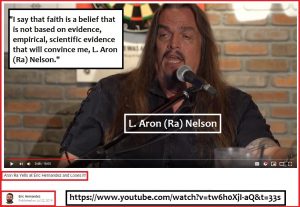
Update May 8, 2021
A.J. Patterson (aka Atheist Jr.) v. Robert Baty – Atheism Debate
(A.J. is a big fan of Aron Ra.)
http://kehvrlb.com/patterson-atheist-jr-v-baty-atheism-debate
Update August 16, 2021
Regarding Irreligiosity and Intelligence!
https://www.us.mensa.org/read/bulletin/features/intelligence-and-unbelief/
(Begin excerpts.)
Intelligence & Unbelief
Irreligiosity is not intellect’s guiding light, great minds prove
|
What role does intelligence play in religiosity? Is it the case that those of higher intelligence are irreligious because of their intelligence? This claim is made so routinely and publicly that its ubiquity can safely be taken for granted.
The logic goes something like: Religion is irrational; people of higher intelligence are capable of higher levels of reason; therefore, their intelligence allows them to see the irrationality of religion; thus, intelligence causes irreligiosity. I want to challenge this notion and hopefully provide perspectives on the issue that seem to be in desperate need of representation.
(End excerpts.)
Update January 20, 2022
Archive of James McMullen’s attempt at the Exercise:
http://kehvrlb.com/james-mcmullen-v-atheism-101-by-robert-baty
Update January 21, 2022
A review of the Campbell-Owen Debate
https://openbookreligion.org/read/debating-for-god/section/8de96e81-7001-4606-89cd-690cb5893c75
On-line link to Campbell-Owen Debate
http://www.theapostolicdoctrine.com/wp-content/uploads/2015/07/Campbell_Owen_Debate.pdf
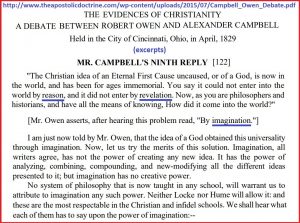
Update October 10, 2022
Up and comer wannabe “bold atheist” and “anti-creationist” activist Jay Bundy demonstrates he can’t handle it. He believes it, but that is all he’s got; like the rest. For all he knows, God does exist.
https://youtu.be/wG2whECtHtA?t=1795
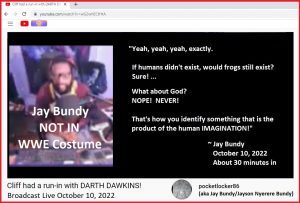
Related Bundy articles on this website are at:
http://kehvrlb.com/jay-bundy-v-kent-hovind
and
http://kehvrlb.com/robert-pennock-v-kent-hovind
A Twitter Exchange!
https://twitter.com/ICM8781/status/1579575867009019905

Update October 11, 2022
Ian Covill and his Alfred Tarski Stunt!
Bwahahahahaha!
I didn’t think we were ever going to get a legitimate citation on that, or an explanation on how Ian came up with it!
Ian is stuck on Question #1.
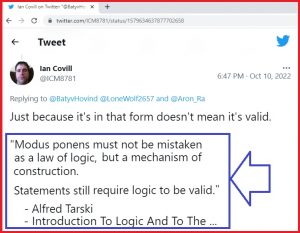
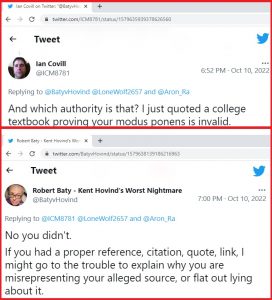
Update January 9, 2023
James Randi’s Position
https://www.facebook.com/groups/kenthovindsworstnightmare/posts/2333199236849192/


Update November 4, 2023
Link to recent Butt v. Shermer Debate on The Existence of God
https://www.youtube.com/watch?v=90PQQM4a75w
Update February 12, 2024
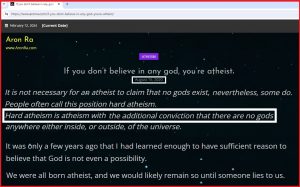
.
.

I am scheduled to record a program with Bernie Dehler on Tuesday, July 19, 2016, for broadcast later via his YouTube channel.
The discussion is to include about 30 minutes on my “6 questions”.
It might be interesting to see how Bernie and I get along in discussing that.
——————————————–
The “if man could imagine a god therefore man did originate the idea of God” via imagination I would need to see your evidence that you got this conclusion from the very first person who offered the idea of God up for humanities consumption. Other than that your argument is meaningless because you simply claim knowledge of what is possible therefore that’s what had to have happened. Not very logical. However it would debunk the idea that a belief in God comes from indoctrination because the very first person whoever thought the idea couldn’t, by definition, have gotten the idea from another person….since they were the first ever.
Q1…no and logically valid is irrelevant, logically sound is the only logic that is in itself useful as an a argument.
But it’s a good argument that the belief in God doesn’t result, or have to result, from indoctrination.
Q2…since !logically valid is meaningless not sure why you think an affirmation adds any weight to the argument.
Q3…you want to know if your inference of the major premise can be made from the conclusion and minor premise? Self referencing arguments tend to be circular.
Q4,5,6,.. You’re an atheists therefore I believe you believe them so the answer is obviously self evident…that would be a yes. Unless you’re not an atheist. In that case I believe atheists may and can believe anything they want.
Btw, modus ponens is an inference of a truth from acknowledged truths. Since the origin of God solely being based on imagination doesn’t fall into the category of proper subject matter,I.E. it solely coming from imagination, for modus ponens you’ve done nothing but commit a personal opinion fallacy.
Vernon writes, in relevant part, proving up the claims I make for my Exercise:
“Q1…no and logically valid is irrelevant,
logically sound is the only logic that
is in itself useful as an a argument.”
I disagree, and notice that Vernon provides nothing to support his false and/or misleading claims.
He would have done better to submit to the proper administration of the Exercise, step by reasonable step with discussion where appropriate.
But Vernon does provide, as noted above, another fine example of how my claims for the Exercise are easily vindicated.
Question #1
Do you think the Atheism 101 Critical Thinking Exercise Argument is so constructed that;
if its premises are true, then its conclusion will follow as true therefrom
(i.e., that it is logically valid)?
– Robert Baty: Yes
– Vernon Smith, Jr.: No
If the argument is not logically valid, as defined in the question, then the other questions don’t really matter, Vernon wins, and I need to start over in developing my Exercise.
I think the Exercise Argument “is so constructed that; if its premises are true, then its conclusion will follow as true therefrom”.
Anyone else care to express their opinion as to whether or not my Argument “is so constructed that; if its premises are true, then its conclusion will follow as true therefrom”?
Who knows, maybe Vernon might even have something to say about his position on that.
————————————————–
VJ Smith has also engaged the matter on my FaceBook page and there has been an extended discussion there.
I am awaiting VJ’s return and indication as to how he might now wish to proceed in trying to actually advance his participation in the Exercise, step by reasonable step.
Those interested can follow that discussion at:
https://www.facebook.com/Atheism101CTE/posts/453769758141301
———————————————–
From: https://www.facebook.com/Atheism101CTE/posts/529317610586515
V.J. SMITH – https://www.facebook.com/BondJr777
v.
ROBERT BATY
Subject: Atheism 101 Critical Thinking Exercise
EXERCISE ARGUMENT
MAJOR PREMISE:
– IF (A) man was able to originate
– the idea/concept of God through
– the power of imagination,
–
– THEN (B) man did originate the
– idea/concept of God through the
– power of imagination.
MINOR PREMISE:
– (A) Man was able to originate the
– idea/concept of God through the
– power of imagination.
CONCLUSION:
– (B) Man did originate the idea/concept
– of God through the power of imagination.
EXERCISE QUESTION #1
Do you think the Atheism 101 Critical Thinking Exercise Argument is so constructed that;
if its premises are true,
then its conclusion will follow as true therefrom
(i.e., that it is logically valid)?
– Robert Baty: Yes
– V.J. Smith: No
CORRESPONDENCE
(1) From V.J. Smith
The argument violates proper subject parameters for modus ponens because God being a product solely of the imagination isn’t an acknowledged truth. So you’ve merely committed a personal opinion fallacy.
—————————–
(2) From Robert Baty
VJ Smith writes, vindicating the claims I make for my Exercise:
“The argument violates proper subject parameters
for modus ponens because God being a product
solely of the imagination isn’t an acknowledged truth.
So you’ve merely committed a personal opinion fallacy.”
Nice try!
That claim is not true.
Maybe VJ, instead of presuming to “know it all”, should first submit to my administration of the Exercise to him, one reasonable step at a time.
Or, maybe he should wait and see how Bernie and I deal with in our scheduled discussion to be recorded tomorrow night for broadcast on YouTube later.
—————————–
(3) From V.J. Smith
In instances of modus ponens we assume as premises that p → q is true and p is true.
Only one line of the truth table—the first—satisfies these two conditions (p and p → q).
On this line, q is also true.
Therefore, whenever p → q is true and p is true, q must also be true.
Your P is not an acknowledged truth.
You assume it is,
I don’t.
Hence your personal opinion fallacy
—————————–
(4) From V.J. Smith
Your “if then” conditional premise relied on a false premise.
That is of course if a human could do something then that means they did do something.
Valid in form is useless when it results in something that isn’t sound logically.
Your argument isn’t sound…..nice try though.
—————————–
(5) From Robert Baty
VJ Smith
If you wish to seriously take part in working through the Exercise, we might first need to resolve some logistical details.
For instance:
(A) Where we might do it, since you appear to have made appearances both here and at kehvrlb.com page dealing with the same issues.
(B) Whether to establish a stand-alone thread/page where we might set up the Exercise for you and then engage the Exercise, one reasonabe step at a time.
I notice you now write:
“In instances of modus ponens we assume as premises that p → q is true and p is true. Only one line of the truth table—the first—satisfies these two conditions (p and p → q). On this line, q is also true. Therefore, whenever p → q is true and p is true, q must also be true.
Your P is not an acknowledged truth. You assume it is, I don’t. Hence your personal opinion fallacy.”
I have given the definition of “valid” to be used in the Exercise in order not to be side-tracked into quibbling about “modus ponens” where there might be some misunderstanding, such as you are exhibiting. In my experience, there is also much misunderstanding as to what a “truth table” has to do with these matters and I would just as soon not be distracted by your confusion over that matter.
We can deal more specificially with your misstatement of the logic of my Argument if we manage to formalize our consideration of your problems with it.
———————————-
(6) From Robert Baty
VJ Smith
While I was posting my last message, you added:
“Your ‘if then’ conditional premise relied on a false premise. That is of course if a human could do something then that means they did do something. Valid in form is useless when it results in something that isn’t sound logically. Your argument isn’t sound…..nice try though.”
Enough of your confused verbosity, already, VJ.
These matters are too important to allow you to sidetrack your efforts to deal appropriately with the Exercise.
I have to leave for awhile, but maybe we can set up a more formal Exercise for you when I return.
———————————
(7) From V.J. Smith
No confusion. There are numerous ways to attack a personal opinion fallacy.
———————————
(8) From Robert Baty
VJ Smith
You may be confused. maybe not.
In any case, you are wrong, but I appreciate your efforts in that they provide a further vindication as to my claims for my Argument/Exercise including the much neglected and fundamental issue reflected therein.
You most recently popped off with:
“No confusion.
There are numerous ways to attack a personal opinion fallacy.”
There is no “personal opinion fallacy” reflected in my Argument or Exercise.
It seems that you, VJ, are hung up on the first question and those logistical details which I mentioned.
Question #1
Do you think the Atheism 101 Critical Thinking Exercise Argument is
so constructed that;
if its premises are true,
then its conclusion will follow as true therefrom
(i.e., that it is logically valid)?
– Robert Baty: Yes
– VJ Smith: No
If you have any serious interest in dealing with that issue and setting up a more formal arrangement to advance that discussion, let me know and let me know your preferences as to the venue and I will setup a stand-alone thread to develop and archive your Exercise results.
For what it’s worth, I have had years of experience with atheists and young-earth creationists who struggled so, as you have, to deal with the simplest of critical thinking issues (i.e., Question #1).
If my Argument is not “so constructed that; if its premises are true,
then its conclusion will follow as true therefrom”, then you win.
It’s been around a long time and challenged by man, VJ, and you are more than welcome to give your best.
So far, you have struck out on this simplest of fundamental matters.
For ready reference, here again is the Argument:
MAJOR PREMISE :
– IF (A) man was able to originate
– the idea/concept of God through
– the power of imagination,
–
– THEN (B) man did originate the
– idea/concept of God through the
– power of imagination.
MINOR PREMISE :
– (A) Man was able to originate the
– idea/concept of God through the
– power of imagination.
CONCLUSION :
– (B) Man did originate the idea/concept
– of God through the power of imagination.
———————————–
(9) From Robert Baty
If VJ is not confused, as he claims, then his efforts here will be all the more valuable in justifying my claims and the importance of this little Exercise and Argument in the popular, public debate regarding atheism and atheists.
————————————-
(10) From Robert Baty
VJ Smith has raised numerous issues that in due time would warrant specific attention. It is not clear what VJ plans to do as far as advancing his responsible participation in the Exercise.
So, I will try to address some of his comments and claims.
VJ writes, in part:
– “…God being a product solely of the imagination…”
That, effectively, is VJ’s affirmation of the conclusion of the Argument used in the Exercise, for those who might still question whether there be such that so affirm.
That affirmation, of course, is built on the supposition that man possessed/possesses the ability to have so originated the notion of God.
That supposition is, quite reasonably, reflected as the minor premise in the Exercise Argument.
So, VJ having effectively shown how we can identify the conclusion and one possible premise we can, therefrom, quite reasonably construct the major premise of the Argument.
So, from VJ’s own admission we have re-constructed the Argument used in the Exercise, which sets us up for trying to resolve VJ’s problem with what is, in effect, his own Argument:
Question #1
Do you think the Atheism 101 Critical Thinking Exercise Argument is
so constructed that;
if its premises are true,
then its conclusion will follow as true therefrom
(i.e., that it is logically valid)?
– Robert Baty: Yes
– VJ Smith: No
Without admitting it explicitly, it seems like VJ has gone from flat out trying to deny the “logical validity” of the Argument to trying to admit to it in some subtle way.
We will see; maybe.
In any case, there are other statements VJ has made which I may deal with later as time and interest allows and which will, I hope, further provide an exposition on why I think he’s just flat out wrong on question #1.
———————————-
(11) From V. J. Smith
The meaning of modus ponens…is based on accepting a conditional statement, as I stated I did not
https://books.google.com/books?id=wDx1SG8tS5oC&pg=PA100
———————————–
(12) From Robert Baty
VJ Smith
If I misrepresented your position, I apologize.
You did write, in relevant part:
– “The argument violates proper subject parameters
– for modus ponens because God being a product
– solely of the imagination isn’t an acknowledged truth.”
So, if you are concerned that I misrepresented you, you would seem to be saying that your position is not that God is a product of imagination.
Maybe you are in agreement with me on that.
If not, you are welcome to clarify your position further. I think you, VJ, are the one who has, in an effort to deal with my Exercise and Argument, have been the more ambiguous and evasive when the Exercise and the claims I make for it and the Argument involve very fundamental and otherwise uncontroversial matters.
So, VJ, how would you like to advance the conversation regarding our differences as to Question #1?
Question #1
Do you think the Atheism 101 Critical Thinking Exercise Argument is
so constructed that;
if its premises are true,
then its conclusion will follow as true therefrom
(i.e., that it is logically valid)?
– Robert Baty: Yes
– VJ Smith: No
I’ll take a look at your other message just posted as time allows. It sounds like another diversion, but I will try to help you understand your problem further in response to it; when I get to it.
The Exercise is not designed for quibbling about “modus ponens”, but if you insist on visiting that, I may be able to indulge you to some degree and help you out your problem with it.
—————————–
(13) From V. J. Smith
So once again my stance…..your argument isn’t logically sound, it doesn’t follow the rules regarding subject matter of modus ponens.
Link provided explaining such.
The conditional of your first premise was rejected.
You’re not capable of knowing how God was conceived by the individual who introduced it into humanity.
And something can be a product of your imagination even if it is existent, I.e. the idea of horse with wings or a unicorn has its origin in an existing thing, a horse.
Your argument may have valid form but that doesn’t mean it is sound, and of course it isn’t logically sound.
—————————-
(14) From Robert Baty
OK, VJ Smith, I looked at your comment:
– “The meaning of modus ponens…is based on accepting
– a conditional statement, as I stated I did not
– https://books.google.com/books?id=wDx1SG8tS5oC&pg=PA100 ”
Again, you may not be confused but you do appear all the more confused as to what your reference says and means as relevant to this discussion.
Maybe it would be better if you quoted what you are actually trying to use from that reference, for I would deny that it says or means that:
– “modus ponens…is based on accepting
– a conditional statement…”
I also note that you seem reluctant to formalize our discussion and so avoid some of the problems in how this conversation is proceeding.
Really, VJ, I just checked your latest submission before forwarding this and see that you are compounding your problems, though they become clearer for those with the requisite critical thinking skills and that is a good thing.
For instance, you write, in part:
– “The conditional of your first premise was rejected.”
and
– “Your argument may have valid form but that doesn’t
– mean it is sound, and of course it isn’t logically sound.”
You don’t have to accept the conditional in order for an argument to be valid and/or sound.
Soundness, however, is not relevant to question #1.
And it seems you agree with me that the Argument is not sound.
I think that is one reason why Atheists in particular are so resistant to facing up to and successfully completing the Exercise.
It’s their Argument, in essence, explicitly and/or implicitly, as you have already helped further demonstrate.
For now, VJ, let’s try to get you to go a bit further. You did well be abandoning your claim the Argument is NOT VALID and are now indicating that maybe you could be moved to think that it is.
Here we are on that:
Question #1
Do you think the Atheism 101 Critical Thinking Exercise Argument is
so constructed that;
if its premises are true,
then its conclusion will follow as true therefrom
(i.e., that it is logically valid)?
– Robert Baty: Yes
– VJ Smith: No
The way the Exericse works, if you are not going to join me in answering “yes”, your default position is “no”.
So, VJ, what say ye now?
Yes?
No?
We can, perhaps, advance the conversation from how you answer and, if “no”, what further reason you may give for your answer.
————————————-
(15) From V. J. Smith
It seems you’re attempting to forward the position if an argument is valid in form you’ve achieved an argument worth promoting.
You have not.
A valid modus ponens has no argumentative value only a sound modus ponens would. Yours is of course the latter.
————————————
(16) From Robert Baty
Remember, VJ Smith, this is a critical thinking exercise and you are, quite admirably, demonstrating that you are struggling with the basics of critical thinking.
I appreciate your vindication of my Exercise and Argument and the claims I make for them.
Your lame attempts to diminish the importance thereof is noted.
We can deal with that later where appropriate.
For now, if you are interested in demonstrating your critical thinking skills and how they might be further developing as I try to lead you through this, one reasonable step at a time, here is where we are at:
Question #1
Do you think the Atheism 101 Critical Thinking Exercise Argument is
so constructed that;
if its premises are true,
then its conclusion will follow as true therefrom
(i.e., that it is logically valid)?
– Robert Baty: Yes
– VJ Smith: No
If you wish to proceed, please, please, let me know if you have changed your position. If not, please explain simply and reasonably why you are maintaining your “no” answer.
I have to leave again for awhile.
I’ll try to keep up later if you wish to continue.
———————————
(17) From V.J. Smith
Answer to question one is your critical exercise is not constructed with true premises.
The obvious flaw is the argument itself.
Major premise does not follow.
Just because a man is able to do something through imagination doesn’t follow that he did do something through imagination.
The rest of the argument is irrelevant because your conditional in premise one is a flaw in reasoning.
So your lame attempt at structuring an argument is the issue.
The link I referenced merely was to demonstrate that, as stated on page 100, modus ponens is inference of acknowledged truths to other truths that are entailed by them.
Your argument fails in this respect.
Nowhere did I say I don’t accept premises therefore it isn’t valid or sound.
It isn’t valid because it does not follow that simply because a man can use imagination that he did use imagination as your conditional statement claims.
So your exercise isn’t an exercise at all. It’s simply a lame attempt at modus ponens with what could be considered a major premise that is flawed logically…I.e. that a man did originate an idea through power of imagination just because he could.
I’m wondering why question one would imply that your major premise was true?
It is not.
I also wonder why it’s relevant what I believe atheists would believe is true. I don’t think any rational atheist would believe premise one is true simply because the logic does not follow.
Getting past premise one is a waste of time, I don’t answer what I think atheists may or may not blindly accept as true, although it’s obvious any atheist that accepts your major premise as true would be logically inept.
Their acceptance of the further reasoning of the argument simply doesn’t interest me as it follows from a flawed major premise.
——————————-
(18) From Robert Baty
Question #1 remains:
Do you think the Atheism 101 Critical Thinking Exercise Argument is
so constructed that;
if its premises are true,
then its conclusion will follow as true therefrom
(i.e., that it is logically valid)?
– Robert Baty: Yes
– VJ Smith: No
VJ Smith, in your mos recent post you write, in part:
– “Answer to question one is your critical exercise
– is not constructed with true premises.”
You seem determined to be stiffnecked as far as successfully completing the Exercise.
However, you do seem to imply that you now know better and that your original claim that the Argument is not “logically valid” is wrong.
You would do well to be explict in your acceptance of my claim regarding that.
You keep running off into the weeds as if you had something of merit to use to impeach my claims for the Exercise and Argument, writing, in part:
– “The rest of the argument is irrelevant because
– your conditional in premise one is a flaw in reasoning.”
That’s false, but we might discuss your problem with that in due time. It further reflects your continuing failure to demonstrate basic critical thinking skills. It’s as if you are just upset because of the subject matter used in the Exercise.
Typical!
You speak of “my argument”, but it’s not my argument. It’s the argument implied by Atheists. I have just presented it in a form where even they can recognize the problems with it. The problems, however, are not quite as you represent them to be.
For instance, one problem is not the logical validity of the Argument as you have proposed.
The problem is that atheists, implicitly or explicitly, think the premises are true, and even you in your blundering can see the problem with that.
That, however, makes the Exercise and Argument all the more valuable in dealing with the fundamental issues involved in atheism and atheists.
You write, in part:
– “It isn’t valid because….”
And the part I left out is where you again run off into the weeds with your blundering; failing to accept the proposition that in this Exercise and in all the authorities I use for dealing with such questions, validity has to do with “form” and not “content”.
However, it is nice that you continue to insist that “no” is going to be your answer to the first question.
A valuable demonstration indeed, VJ, and I thank you for it.
You also wrote, in part:
– “I’m wondering why question one would imply
– that your major premise was true?”
More of your blundering. I have not implied that the major premise is true. Not at all. However, the Exercise demonstrates that some atheists do believe it to be true; implicitly or explicitly.
As to why, VJ, you have to get over your blundering and understand the Exercise details, and you seem determined to evade completing the Exercise successfully so that that might be further demonstrated by our dealing with your own answers and the proper application of basic critical thinking skills.
Your resistance is another helpful demonstration vindicating the claims I make for my Exercise and Argument.
You write:
– “Any atheist that accepts your major premise
– as true would be logically inept.”
It’s not my major premise, VJ, it’s the major premise of the atheists who are so bold to exclaim, unconditionally, that man originated the idea of God via “imagination”.
See, even you can see the problem with the atheist’s argument when it is presented in such simple, logically valid form.
From my experience, that is one reason why atheists rail so against the Exercise and Argument even to the point of demonstrating for me that they reject basic critical thinking principles (i.e., trying to deny the simply, logical validity of my Argument).
Let me know if you want to get serious about dealing with your hang up on Question #1; your continual denial that the Argument is logically valid. Maybe we can yet advance the conversation and get you to think “yes” like I do and move on to the next question.
Question #1 remains:
Do you think the Atheism 101 Critical Thinking Exercise Argument is
so constructed that;
if its premises are true,
then its conclusion will follow as true therefrom
(i.e., that it is logically valid)?
– Robert Baty: Yes
– VJ Smith: No
You wrote, in part, regarding that:
– “The link I referenced merely was to demonstrate that,
– as stated on page 100, modus ponens is inference of
– acknowledged truths to other truths that are entailed
– by them. Your argument fails in this respect.”
That’s false!
You simply don’t seem to understand what that reference is trying to tell you about the matter. It might help if we could agree to use a more appropriate on-line authority if you wish to quibble about modus ponens. The writers of that book appear to have failed to appreciate and take into account how people like you would misuse their comments; lest they also be confused and/or misunderstand the notion of logical validity of the form I use for my Argument.
I’m out again for awhile.
Maybe we will have more to consider later.
And, of course, tonight is my scheduled meeting with Bernie Dehler to record a show including a discussion of these things.
—————————-
(19) From V.J. Smith
crit·i·cal think·ing
noun
the objective analysis and evaluation of an
issue in order to form a judgment.
You got my analysis and evaluation and I gave you my judgement.
Hint. Next time don’t ask “do you think there is an atheist who believes…….” that doesn’t entail critical thinking, that entails mind reading and guessing.
You sound like the typical person who never got passed freshman logic courses in college.
They make the same mistake as you in regards to modus ponens.
Your argument is useless and that’s what a critical thinker would tell you.
———————————–
(20) From V.J. Smith
One last thought since you obviously missed the point….(Latin for “the way that affirms by affirming”; generally abbreviated to MP or modus ponens)…..
Just let me know when you’re capable of grasping the fact you CANNOT affirm an opinion, hence the inference of truth from acknowledged truths not the possibility that an opinion happens as a result of merely placing “if” I say I can affirm my opinion, “then” I can.
Lmao
————————————
(21) From Robert Baty
Bwahahahahahahaha!
VJ Smith, you write, in part:
– “You got my analysis and evaluation and I gave
– you my judgement. Hint. Next time don’t ask
– ‘do you think there is an atheist who believes’,
– that doesn’t entail critical thinking, that entails
– mind reading and guessing.”
Silly man. You contribute a valuable contribution to the history of the public debate over such things and blunder so by telling us what you think by telling us not to ask you what you think.
Silly man. Of course, I will agree that asking you what you think “doesn’t entail critical thinking”, but what you think tells us a lot about your problems with critical thinking when atheism is the subject matter.
You have proved the value of my Exercise and Argument and I appreciate your vindication of the claims I make for them.
One final thought, maybe, maybe not; let me know when you are ready to openly and honestly deal with your problem in failing to accept and acknowledge a logically valid modus ponens form argument such as used in this Exercise.
So, we let you run off from the Exercise where we started;
Question #1
Do you think the Atheism 101 Critical Thinking Exercise Argument is
so constructed that;
if its premises are true,
then its conclusion will follow as true therefrom
(i.e., that it is logically valid)?
– Robert Baty: Yes
– VJ Smith: No
———————————————————————
Pingback:A Christian Not An Atheist Sparked Lawsuit On Clergy Tax Free Housing Allowances – TCNN: The Constitutional News Network
McKinnon Mitchell tried to challenge my Atheism 101 Critical Thinking Argument & Exercise.
.
It didn’t turn out so well for him.
.
See:
https://www.facebook.com/groups/kenthovindsworstnightmare/permalink/1471333616369096/
.
Hi Robert
Thanks for the opportunity to answer these questions. Hopefully this 4th attempt is successful. 🙂
I do so from the position of an atheist but without any philosophical training or background.
I’ll attempt to answer the questions as honestly as possible however I’m not sure I understand any of the questions!
A1. I understand that if the premises are true then the conclusion is necessarily true. If that’s the question my answer is Yes.
A2. I really don’t understand this question even after Googling modus ponens. However I don’t think that it follows that just because we are able to do X that we will in fact do X. If that is what the question is asking?
A3. I am thrown by the use of “inferred” in this question. I thought this was a deductive process? It’s certainly possible that the conclusion is true but I don’t see how it’s necessarily true, at the moment anyway.
A4. Yes but I don’t understand why this is relevant?
A5. Yes but I don’t understand why this is relevant?
A6. Yes but I don’t understand why this is relevant?
Despite my answer to question two, given the number of god concepts that exist and if at least some of these concepts are mutually exclusive, i would be willing to say that some god’s have been imagined, it’s possible to me that all god’s have in fact been imagined, however that would not rule out the possibility of an god in existence that hasn’t been imagined and is as yet to be discovered.
I also was wondering why “imagined” would be the process of existence. I see elsewhere that you’re defining this term as broadly as possible in an attempt to create a true dichotomy when compared to an external source. Correct? I think I’m fine with that but how could you exclude an non supernatural external source such as nature? Or indeed some other yet unknown source?
Kind regards
Tony
@ Grey Goose
.
Q2 has to do with how one might construct the argument behind the claims of some 3rd party.
.
Try Googling “Enthymeme”. I propose the answer to Q2 is “yes” because it is commonly
understood that if you are given a minor premise and conclusion, you can infer what the
missing major premise of a modus ponens argument is so you can properly set up the
complete, though unstated, argument.
.
Q3 is just an inquiry as to whether you recognize that the major premise of the exercise
argument is properly inferred from the minor premise and conclusion.
.
You can use “deduced” in lieu of “inferred” if you wish.
.
The complete argument is a deductive argument; modus ponens in form.
.
Q4, Q5, Q6 have to do with demonstrating your familiarity with the atheism/theism dispute and some of the promoters thereof.
.
I think Campbell, in his dispute with Owen properly exhausted the possibilities with “reason”, “revelation”, and “imagination”. I think any alternative label you might wish to come up with can be properly put in one of those categories.
.
“Nature”, for example, would fall in the category of “reason”, the deist notion that God exists and if you took a walk in the woods you could properly “reason” to God from what you saw there, without “revelation” or “imagination”. I’m trying to keep it simple, and on a fundamental level.
.